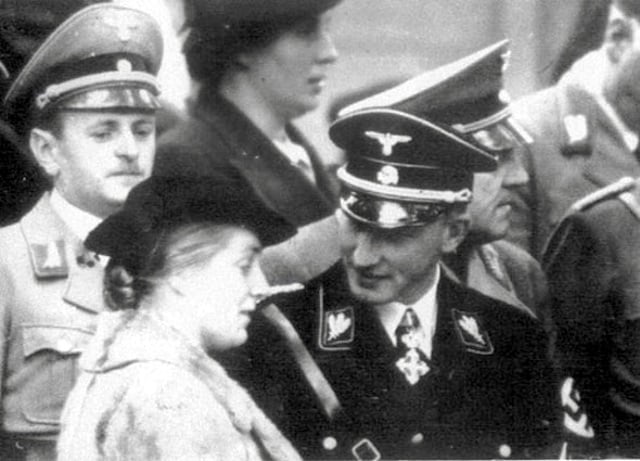Tens of thousands of Nazi war crimes suspects may have continued receiving disability pensions despite a law passed nearly two decades ago ordering them revoked, according to an official review quietly published Tuesday.
The review, commissioned by Germany’s Labor Ministry and posted on its website, found that only 99 people lost their payments after it was concluded that they had participated in “crimes against the principles of humanity.”
It said that several factors led to the poor success rate, including the sheer scale of reviewing tens of thousands of cases, the lack of digitization of key files, legal challenges and, in some cases, apathy in implementing the law.
When the law was passed in 1998, the expectation was that up to 50,000 people would lose their pensions, the report said. But the review found only 99. The research covered the years 1998-2013 but no more have been removed since then.
‘Incredibly Disappointing’
“The results are incredibly disappointing,” said Efraim Zuroff, the top Nazi hunter at the Simon Wiesenthal Center. “I never thought in my worst nightmares that the number would be so low.”
The Labor Ministry told The Associated Press the report reveals the expectations raised by the 1998 law “have certainly not been fulfilled” but the revocation of disability pensions “is still possible in the future.”
In 1950, West Germany approved special pensions for “victims of war” for those injured in World War II, at which time some 4.4 million people qualified for payments. Recipients ranged from civilians injured in Allied bombings to SS death camp guards, as well as their widows and some other dependents.
Lina Heydrich, the widow of assassinated top Nazi Reinhard , one of the main architects of the Holocaust, was among the most prominent recipients in the last category. She died in 1985.
In 1998, amid outrage that possible war criminals were receiving compensation but many Jewish and other Nazi victims were not, the law was changed to exclude anyone who had committed “crimes against the principles of humanity or the rule of law.”
At that point, some 940,000 people were still receiving the pensions.
Germany’s strict privacy laws and the fact that the administration of the pensions is split among the country’s 16 states meant the report’s researchers had incomplete information and so could not specify exactly how many recipients were former military.
They did determine, however, that eight states reported in 1998 a total of 23,501 former SS troops receiving disability pensions. The other eight states failed to respond, the report notes.
After the law was passed, the Wiesenthal Center, under contract from the government, supplied more than 70,000 names of war crimes suspects to the Labor Ministry, to be checked against pension payments. German historian Stefan Klemp, who helped compile the Wiesenthal Center’s list, was the main author of the new analysis commissioned by the Ministry.
Klemp said he was not permitted to comment on the report.
Cumbersome and Less Efficient
Because of German privacy laws, introduced partly in reaction to the Nazi surveillance state, the Wiesenthal Center had no access to the pension lists that it could independently check, Zuroff said.
“That made things incredibly cumbersome and less efficient,” Zuroff said in a phone interview from Lithuania. “If we had been able to just focus on specific cases, I think this would have been a very different project.”
The special prosecutors’ office in Ludwigsburg, which investigates Nazi war crimes, also hired additional staff to pore through investigative card indexes for names that could be compared to pension lists. In six months, 11 employees assembled 90,000 names.
Since the card indexes had only last names and no dates of birth, many matches — especially in cases of common names — meant much additional research. Some 26,000 cases were referred back to Ludwigsburg for further investigation.
Based upon responses from five states, researchers determined that 1,306 pension recipients were on lists provided with the Wiesenthal Center but they were unable to come up with an overall number of positive matches.
They had no access to many individual names due to privacy laws, but did uncover some cases illustrating other problems.
In one, the state of Baden-Wuerttemberg identified former Auschwitz SS guard Heinz K. as a pension recipient possibly responsible for war crimes. K., whose last name was not released and is now deceased, told investigators he worked in a radio room and later the kitchens, and was not involved in any killings.
State pension administrators then shelved the case, though the report states the Ludwigsburg prosecutors had noted that K.’s “position in Auschwitz as a post and block leader was in complete contradiction” to his denial. Block leaders were, among other things, responsible for the discipline and punishment of prisoners.
State administrators apparently “never made the first attempt to check the truthfulness of K.’s statements,” the report concluded.
Several people whose pensions were removed got the decisions overturned on appeal.
As of last year, some 150,000 people were receiving the pensions but Zuroff said that the report shows the effort to remove them had effectively ended.
“From our perspective the project is over,” he said.
By: AP
Do You Love Israel? Make a Donation - Show Your Support!
Donate to vital charities that help protect Israeli citizens and inspire millions around the world to support Israel too!
Now more than ever, Israel needs your help to fight and win the war -- including on the battlefield of public opinion.
Antisemitism, anti-Israel bias and boycotts are out of control. Israel's enemies are inciting terror and violence against innocent Israelis and Jews around the world. Help us fight back!
